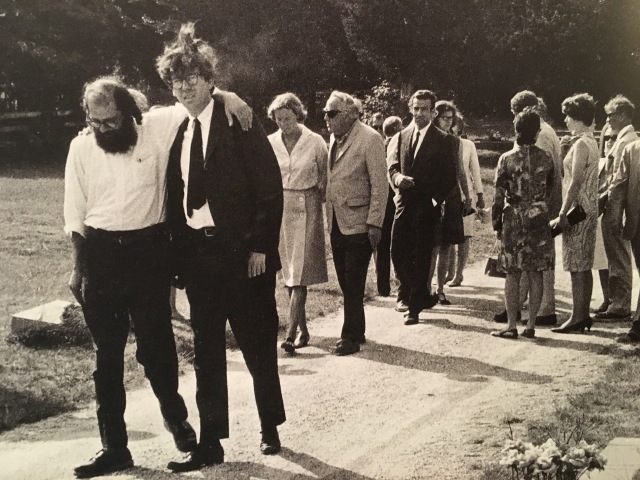Buried at Springs, Schuyler's elegy for O'Hara, demonstrates, among other things, his remarkable sensitivity to nature; it's almost a nature poem – a strange way to elegise the most urban of New Yorkers; but this is a very oblique elegy, its emotion tightly contained. It's probably the best of the poems written for O'Hara after his sudden, incongruous death (run over by a jeep on Fire Island).
At the funeral, John Ashbery read O'Hara's own To the Harbormaster – or tried to: he was overcome by emotion, as were many on that extraordinary day, when the whole of artistic New York descended on the cemetery at Springs, Long Island (the picture above shows a distraught Allan Ginsberg and Kenneth Koch leaving the funeral). There were outpourings of raw grief galore – the most extreme a grisly tirade by the painter Larry Rivers – but Schuyler's elegy, written after the event, at Fairfield Porter's home on Great Spruce Island (where O'Hara had visited some years before), is a work of art...
There is a hornet in the room
and one of us will have to go
out the window into the late
August midafternoon sun. I
won. There is a certain challenge
in being humane to hornets
but not much. A launch draws
two lines of wake behind it
on the bay like a delta
with a melted base. Sandy
billows, or so they look,
of feathery ripe heads of grass,
an acid-yellow kind of
goldenrod glowing or glowering
in shade. Rocks with rags
of shadow, washed dust clouts
that will never bleach.
It is not like this at all.
The rapid running of the
lapping water a hollow knock
of someone shipping oars:
it’s eleven years since
Frank sat at this desk and
saw and heard it all
the incessant water the
immutable crickets only
not the same: new needles
on the spruce, new seaweed
on the low-tide rocks
other grass and other water
even the great gold lichen
on a granite boulder
even the boulder quite
literally is not the same
II
A day subtle and suppressed
in mounds of juniper enfolding
scratchy pockets of shadow
while bigness—rocks, trees, a stump—
stands shadowless in an overcast
of ripe grass. There is nothing
but shade, like the boggy depths
of a stand of spruce, its resonance
just the thin scream
of mosquitoes ascending.
Boats are light lumps on the bay
stretching past erased islands
to ocean and the terrible tumble
and London (“rain persisting”)
and Paris (“changing to rain”).
Delicate day, setting the bright
of a young spruce against the cold
of an old one hung with unripe cones
each exuding at its tip
gum, pungent, clear as a tear,
a day tarnished and fractured
as the quartz in the rocks
of a dulled and distant point,
a day like a gull passing
with a slow flapping of wings
in a kind of lope, without
breeze enough to shake loose
the last of the fireweed flowers,
a faintly clammy day, like wet silk
stained by one dead branch
the harsh russet of dried blood.


No comments:
Post a Comment